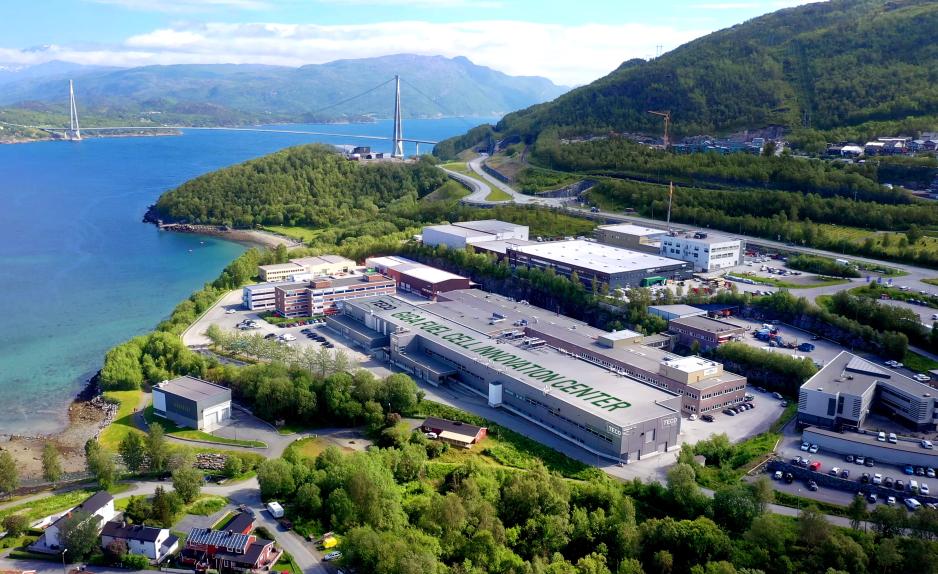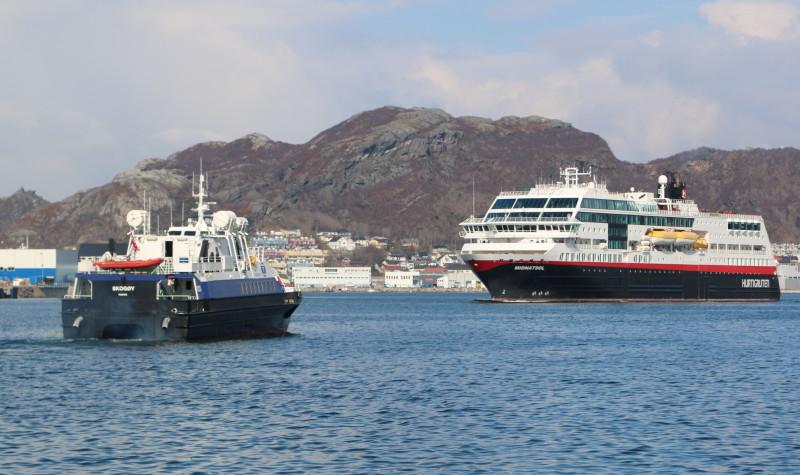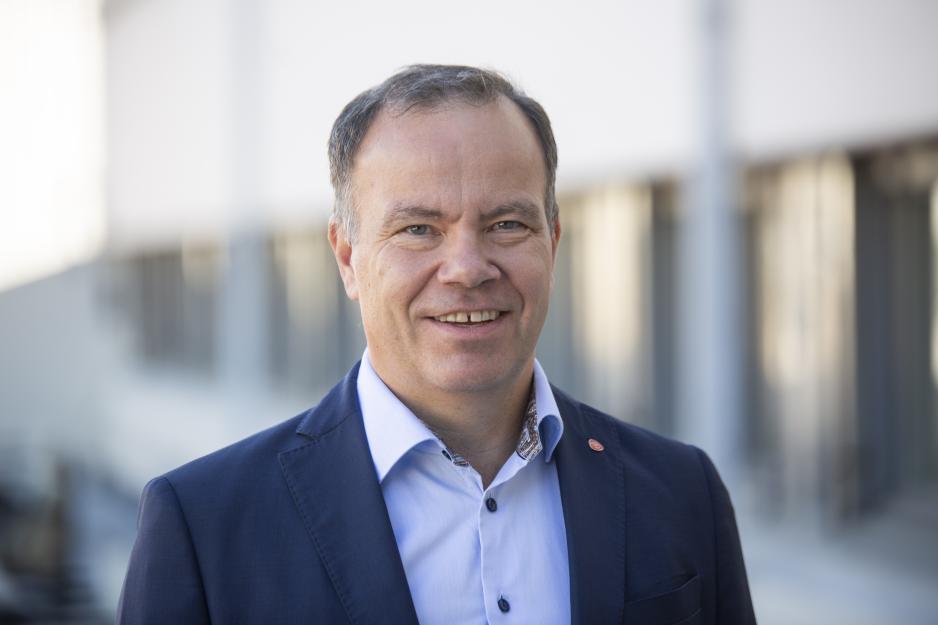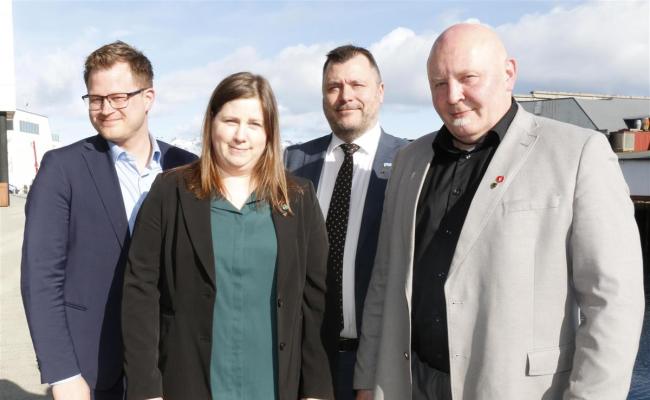Plans to Create Hydrogen Solutions in Narvik to Cut Maritime Emissions Likely Put On Hold

At the end of September, TECO 2030 announced a strategic shift from manufacturing fuel cells in Norway today to positioning itself as a global technology provider. Illustrative photo shows TECO 2030's Innovation Center in Narvik, Northern Norway.
The company TECO 2030 is NOK 400 million away from initiating a full-scale production of hydrogen-based fuel cells in Narvik, Northern Norway. CEO Tore Enger says the money market in Norway is "dry" for both public and private capital. He is turning his gaze toward the US and India.
"We see it necessary to go where there is interest," says CEO Tore Enger of TECO 2030 in an interview with High North News.
Recently, the Norwegian based clean tech company announced a change in course away from Norway. The company planned to produce hydrogen-based fuel cells for maritime use in Narvik, Northern Norway. Thus, it positioned itself to become a leading vendor of zero-emission technology for ships and the green shift in the maritime sector.
Now, the company considers it necessary to seek opportunities abroad and specifically blames unpredictable framework conditions in Norway and a lack of available capital.
"The money market in Norway today is completely dry, so to speak. This applies to the public, the private, and the half-private. We have talked to tens of potential investors in Norway, with no result," says Enger.
NOK 400 million off
The CEO first and foremost critiques what he believes is Norwegian authorities' lack of support for companies such as TECO, which want to invest in the green shift.
"In meetings with the Norwegian Ministry of Trade, Industry, and Fisheries, we hear that we have done everything right, that the plans are exciting, and that we must make something happen. But we need more support from the authorities. Little is done to help businesses such as ours to launch a new industry," maintains Enger.
He says the company has invested NOK 800 million so far, together with the shareholders, equipment providers, and Austrian partners.
In 2021, Innovation Norway awarded the company NOK 50 million on the condition that TECO itself would gather NOK 160 million in equity from other investors. The company fulfilled this condition in March 2023.
According to the TECO CEO, the company still needs NOK 400 million to launch a full-scale production in Norway and could, at that point, export products worth EUR 1 billion per year to the international market.
Calls for contributions
What measures would you want to see from the government?
"We have said that we are NOK 400 million away from introducing full-scale production in Norway. One idea is that such support could come as a combination of both loans and pure financing grants."
"In regard to the green shift that the world is to embark on now, the government must contribute in the starting phase. Private capital is also essential, but the government must also contribute in order for this to succeed ," says Enger.

With the plans for mass production of hydrogen-based fuel cells, TECO 2030 aimed toward becoming a leading vendor of zero-emission technology for greener shipping. Photo to illustrate. (Photo: Linda Storholm)
Eye on the US and India
Enger believes there is currently a particularly low interest in the green shift in Norway.
"We see it necessary to go where there's interest, such as the US and India. Sadly, this means we don't know what will happen with the production in Narvik and Norway," he says and continues.
"As of now, nothing is to indicate that there will be a production in Norway anytime soon – unless anything happens – as we don't have the money to do it. We must start up where it is possible to survive," he says.
"The Biden Administration has awarded USD 370 billion to the green shift [through the Inflation Reduction Act, ed. note]. Norway hardly contributes with anything," Enger argues.
"Private actors must lead the way"
When asked about the Norwegian Ministry of Trade, Industry, and Fisheries' respons to Enger's criticism, State Secretary Tomas Norvoll (Labor) clarifies that mainly private actors and private capital must lead the way in the green shift.
"The government wants to facilitate green business and industry development across the country with good framework conditions, but the business sector itself must take the lead and take the opportunities and solve the challenges related to the transition," says Norvoll and continues:
"USA investing heavily in transitioning and industry is a good thing. It could contribute to cutting global emissions and lowering costs related to investments in green solutions. On Norway's part, we already have good support schemes and prerequisites to be part of the shift, but the basic principle is that private actors and private capital must lead the way. Norway would not benefit from a subsidy race, but we also do a lot considering the size of our economy."

"Norway would not benefit from a subsidy race, but we also do a lot considering the size of our economy," says State Secretary Tomas Norvoll (Labor) of the Norwegian Ministry of Trade, Industry, and Fisheries. (Photo: the Norwegian Ministry of Trade, Industry, and Fisheries / David Berg Tvetene).
New industry white paper in 2025
What are the state secretary's thoughts on how several businesses that have positioned themselves in the green shift are looking for opportunities abroad?
"The government has ambitions for the green industrial initiative. We have said that we will contribute to green, profitable, and attractive workplaces across the country, increase mainland investments and exports, and cut emissions. In a free business sector, it is naturally up to the businesses to make the final decisions on investments and locations," says Norvoll.
Does the government plan to stop a development where green industrial projects in the north put their plans on hold?
"Things are going well in big parts of the Norwegian industry, and we want activity nationwide. Northern Norway is no exception. On the contrary, the north is one of the centers for new industrial development," replies the state secretary and continues:
"We acknowledge that there are great opportunities but also challenges, which is why we are currently working on a new industry white paper to be presented in the spring of 2025. We now visit industry businesses and industrial workers nationwide to listen and gather input. Actors from Northern Norway have also contributed to this work, which we will take with us."
"Northern Norway has valuable natural resources, strong knowledge environments, and industrial expertise, which are important prerequisites to develop profitable and green workplaces. We have already done a lot, such as the Green Industry Financing Fund, which is set up as a risk loan scheme under Innovation Norway. The scheme has a loan limit of NOK 5 billion and will help speed up the transition. Businesses in Northern Norway can also apply," he says.
"Unpredictable framework conditions"
Enger also critiques the government's changes to framework conditions, which he says creates uncertainty for the company's operations.
"The parliament has adopted zero emission requirements for the world heritage fjords from January 1st, 2026, but the government has now undone this decision at the stroke of a pen and moved the implementation [for larger ships, ed. note] to 2032. We are developing what we do precisely with a view to an emission-free maritime industry."
The government announced at the end of August that the zero-emission requirement for the world heritage fjords from 2026 will first apply to tourist ships and ferries under 10,000 gross tonnes. The requirement is postponed for larger ships and will apply from January 1st, 2032.
State Secretary Norvoll points out the necessity for the largest ships to be given time to readjust.
"It is important for climate policy that our decisions are clear and do not create uncertainty in the market. They must also be accepted by the local community and the relevant industries," he adds.
Experiencing significant uncertainty
In an open letter to the Ministry of Trade, Industry, and Fisheries, Enger states that the company's potential investors do not trust that emission reduction requirements will actually be implemented.
"The state has also long announced zero emission requirements for ferries from 2023, but the regulation is not coming. Nor was sufficient funding provided for the zero-emission high-speed ferries that was promised by 2024," writes the CEO and elaborates:
"We had competed for the county council's project on a hydrogen-powered high-speed ferries, delivered an approved design in accordance with the contract, and were pre-qualified to offer a vessel, but funding did not materialize, and the contract was canceled."
"The early-phase projects are extremely important to us as a start-up company with new forward-looking zero-emission technology, and it is extremely harmful when these projects and requirements disappear."
Enger summarizes:
"When the commitment to zero emissions loses credibility, it also becomes impossible to raise private capital."
Announces strengthened commitment to zero emission ferries and high-speed ferries
In connection with the state budget, which was presented on Monday, Transport Minister Jon-Ivar Nygård (Labor) says that the government will introduce zero-emissions requirements for ferries from January 1st, 2025.
The requirement will apply to public tenders for ferries and ferry services announced on January 1st, 2025. According to the announcement, there will be some exceptions to the zero-emission requirements, including where biogas is used and where the requirement is not technically or financially feasible to implement.
To contribute to the faster phasing of zero-emission technology for high-speed ferries, the government proposes strengthening the financial framework for the Norwegian Environment Agency's authority to support county-level high-speed ferry projects through the high-speed ferry program. This program is an application-based grant scheme for county projects that will contribute to lower emissions from high-speed ferries.
About TECO 2030's strategy shift:
TECO 2030 recently announced a strategic shift from producing fuel cells in Norway today to positioning itself as a global technology supplier. According to the company, this means moving the company's production plans on licensing agreements to countries where conditions are more favorable.
"As opportunities in regions like the U.S., India, and Southeast Asia grow, driven by strong government support and substantial public investment in hydrogen, TECO 2030 is positioning itself to take full advantage," the company writes in a press release.
"In the U.S., initiatives like the Bipartisan Infrastructure Law and the Inflation Reduction Act (IRA) are creating favorable conditions for hydrogen development, with $8 billion allocated for hydrogen hubs and $369 billion dedicated to climate and energy initiatives."
"TECO 2030 will pursue these opportunities through its American entity, TECO2030 INC, positioning the company to capture a significant share of the growing U.S. hydrogen market. Similarly, India is pursuing government-backed projects aimed at reducing emissions and expanding renewable energy infrastructure."
Source: Teco2030.no





